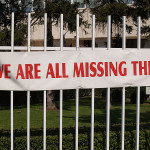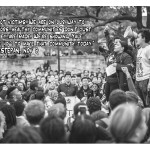You stand on College and Grove Street. Staring intently at the spotlight, you wait to cross the street in a group of twenty students all huddled together. Suddenly someone walks right past the group (most times, but not always, a man, and most times, but not always, white) and crosses the street without hesitation. The huddled mass follows like hypnotized ducklings behind him once they realize the cars are stopping. Sometimes the cars beep. Sometimes the drivers lean out their windows. But most of the time the group crosses, and that’s the end of it.
This was a culture-shock. Back in California, people waited to cross the street. Yet as I walked along Elm Street, York Street, and College Street, students strolled across the asphalt with the confidence of someone who knows their lives are not in danger even if they walk during other drivers’ green light. They knew, it seemed, that people would stop for them. I thought maybe this was one of those East Coast things I’d just struggle to understand, like why people don’t smile at each other in the street or why people say baconeggandcheese like it’s one singular word. But something about it didn’t seem right. Because the same people who always crossed the street even when the pedestrian traffic light was red were the students who used words like “applicable infinitesimal dichotomy” in section for no other reason than to assert their Yale-ness and superiority.
There was something about the way that some of my peers interacted with space that didn’t sit well with me. And suddenly, my awareness of just how much space Yale students take up in the city of New Haven raised dramatically. I noticed the groups of students who blocked the entire sidewalk, not bothering to move when they saw someone else walking their way. I noticed men walking straight into me due to their refusal to say excuse me. I noticed students looking right through dining hall workers, janitors, and administrative assistants as if they weren’t important enough to even warrant a smile. I noticed stacks of dirty plates left on dining hall tables. I noticed the lack of ‘thank you’ and ‘excuse me’ and ‘sorry.’ What seemed like an abnormality in the way people crossed the street was more than just a lack of spatial awareness. It was a sense of entitlement.
Recently, a story broke out at a Target in Brooklyn, New York. A white woman reached over a black child without saying excuse me to grab an item. The child’s mother cussed out the woman for her lack of manners. The woman filmed the encounter, thereby labeling the mother as angry, violent, and unfit. When I heard about this, I realized why the ways in which Yale students interacted with the space around them discomforted me. People of color are always forced to make space for white people. White folks are notorious for seeing right through us, running into us on the sidewalk, invading our personal space, and refusing to acknowledge us. The situation in Brooklyn is not an isolated one. It is a pattern of behavior rooted in privilege. Wherever privilege exists, whether it is racial or otherwise, so do the politics of space.
With every moment that you interfere with someone else’s drive or that you nudge another student as you walk along the sidewalk, your body language communicates that that what you’re doing is infinitely more important than what they’re doing. You’re saying that getting to your class or your meeting is more important than their drive to work. When you speed walk past janitors and dining hall workers without sparing a smile, you’re saying that you getting to where you need to be is more important than their humanity. But New Haven is important, and so are New Haven’s residents. Their day-to-day lives are not less important than any of ours. The way that Yale sits in New Haven is political, so the ways that we move within New Haven are political. We, as Yale students, must make space on the pavement for people to walk. We must choose to see New Haven.
~Alex Rocha-Alvarez ’22


